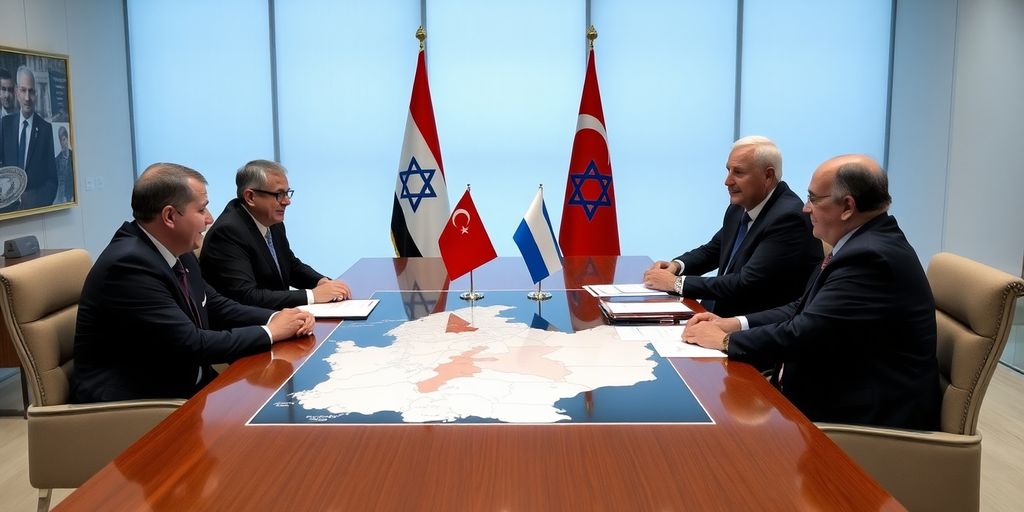Israeli and Turkish officials recently convened in Azerbaijan to initiate discussions aimed at preventing military clashes in Syria. This meeting marks a significant step towards establishing a deconfliction mechanism between the two nations, both of which have active military interests in the region.
Key Takeaways
- Location of Talks: The discussions took place in Azerbaijan, facilitated by President Ilham Aliyev.
- Objective: The primary goal is to prevent misunderstandings and potential military confrontations in Syria.
- Israeli Red Lines: Israel has clearly stated that any establishment of Turkish military bases in Syria, particularly in the Palmyra area, is a red line.
- Ongoing Tensions: The backdrop of these talks includes heightened military activity and airstrikes by Israel in Syria, aimed at countering perceived threats from Turkey and other regional actors.
Background of the Talks
The recent meeting between Israeli and Turkish delegations is a response to escalating tensions following the ousting of Syrian President Bashar al-Assad. Both countries have expressed concerns over each other’s military operations in Syria, leading to a need for dialogue to avoid potential conflicts.
During the talks, Israeli officials emphasized that any changes in the deployment of foreign forces in Syria would be unacceptable. They reiterated that the responsibility for maintaining stability lies with the Syrian government, particularly under President Ahmed al-Sharaa.
Mechanism for Deconfliction
The discussions included plans to establish a deconfliction mechanism similar to those already in place between Israel and Russia. This mechanism aims to facilitate communication and coordination between the two militaries to prevent accidental confrontations.
Turkish Foreign Minister Hakan Fidan highlighted the necessity of such a mechanism, stating that it is crucial for ensuring that military operations do not lead to misunderstandings. He noted that technical teams from both countries would continue to communicate as needed.
Regional Implications
The talks come at a time when both nations are navigating complex geopolitical landscapes. Turkey’s increasing military presence in Syria has raised alarms in Israel, which fears that such developments could hinder its operational freedom in the region. Israel has conducted numerous airstrikes targeting sites it believes could bolster Turkish military capabilities.
Despite the ongoing tensions, both countries have expressed a desire to avoid direct confrontation. Israeli Prime Minister Benjamin Netanyahu has indicated that while Israel is not seeking conflict, it will act decisively to protect its interests if necessary.
Future Prospects
Azerbaijan’s role as a mediator is significant, as it has historically facilitated dialogue between Turkey and Israel. President Aliyev has expressed hope that these talks will lead to normalization of relations, despite the existing mistrust and concerns.
As the situation in Syria continues to evolve, the establishment of a deconfliction mechanism could play a crucial role in maintaining stability in the region. Both Turkey and Israel recognize the importance of dialogue in preventing military escalation, which could have far-reaching consequences for regional security.
Sources
- Israel confirms talks with Turkey on Syria aimed at preserving ‘security stability’, The Times of Israel.
- Israel and Turkey hold Syria deconfliction talks to avoid military clash, The Times of Israel.
- Israel confirms talks with Turkey in Azerbaijan, lays out its ‘red line’ in Syria, The Times of Israel.
- Azerbaijan hosts Turkey-Israel talks to ease Syria tensions, Turkish Minute.
- Turkey, Israel have begun talks to avoid clashes in Syria, sources say, Reuters.






